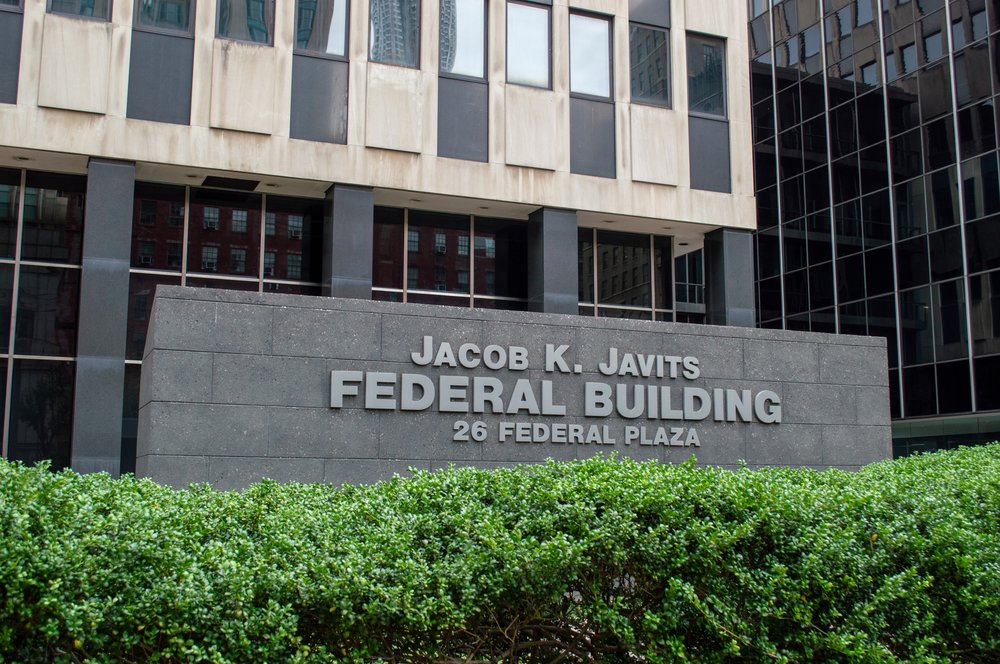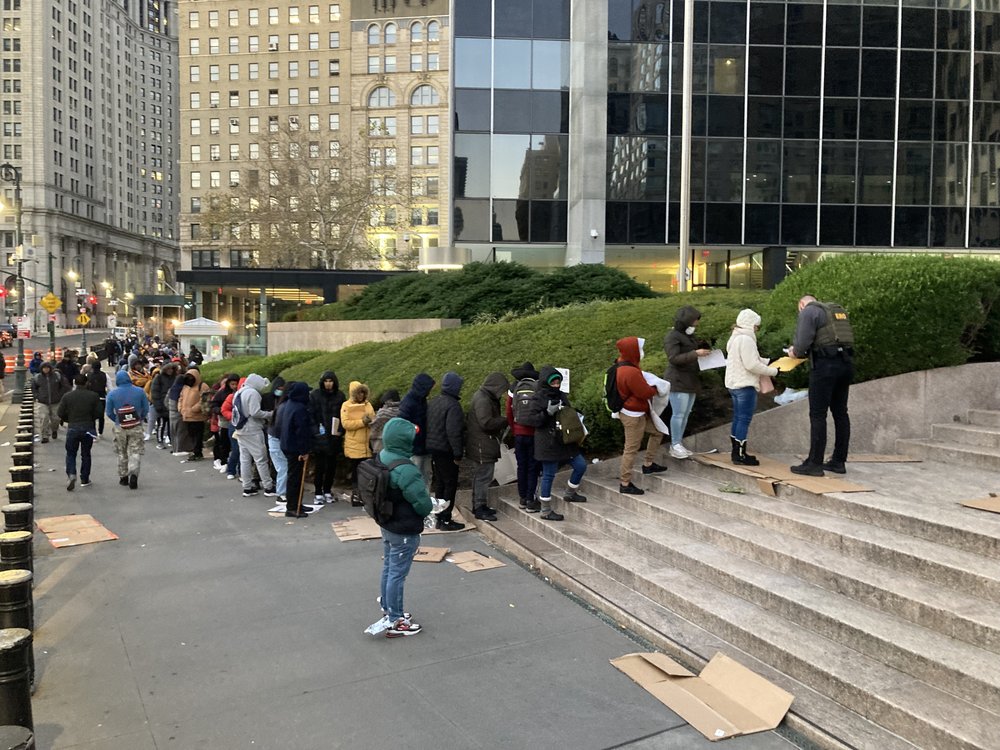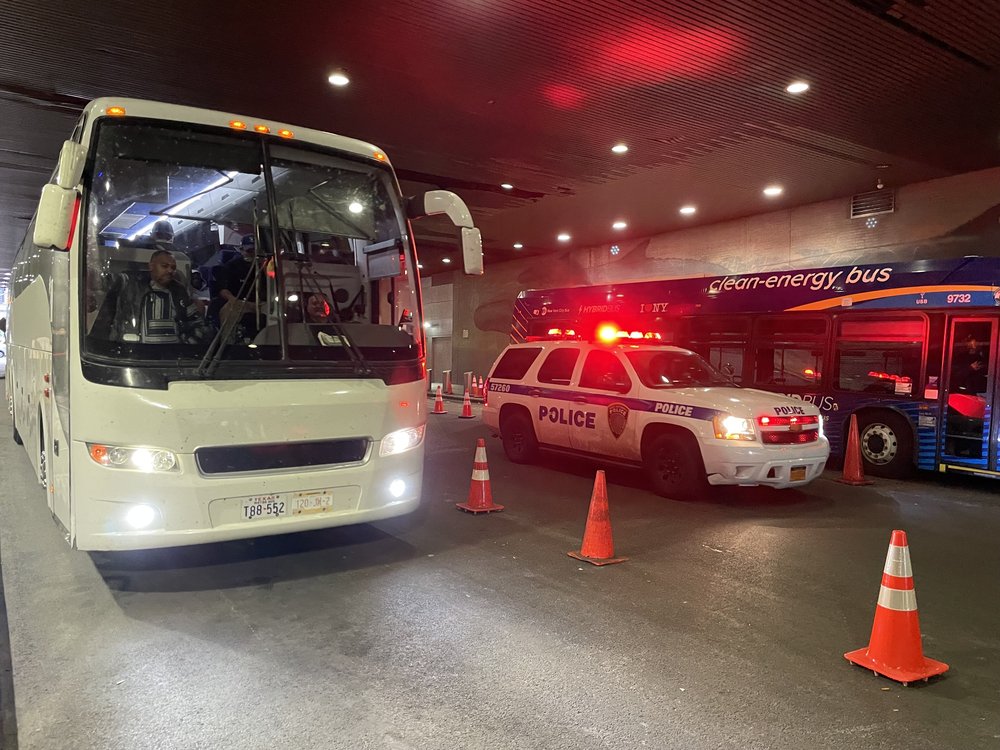NYC’s immigration court delays could jeopardize migrants’ chance at asylum
May 11, 2023, 6:01 a.m.
Immigration rights advocates say administrative backlogs already have triggered removal orders for new arrivals trying to follow the rules.

As New York City braces for another influx of migrants, people seeking asylum are already facing mounting court delays that jeopardize their legal status. And the backlog is set to grow worse, immigration attorneys say.
Migrants face a one-year deadline to file for asylum after arriving in the U.S., but many can’t even get a day in court to apply for the protection, according to attorneys, advocates, and new arrivals.
With the arrival of more than 60,000 migrants into the city last year, lines several blocks long routinely snake around 26 Federal Plaza, which houses the local Immigration and Customs Enforcement offices and the city’s main immigration courthouse.
Many newcomers wait outside for hours in hopes of an appointment with ICE to kickstart the court process, only to be turned away empty-handed. Migrants and attorneys say this has continued to be the case for months, after Gothamist reported on the phenomenon last year.

And guards outside are even turning away migrants with scheduled court hearings, multiple local immigration attorneys say. Dozens of new migrants have been ordered deported for missing their one-year deadline — often without even being alerted — said attorneys for nonprofit Catholic Charities, which has been assisting migrants for decades in New York City.
“There is honestly chaos outside of 26 Federal Plaza,” said Lauren Wyatt, a managing attorney at Catholic Charities who is in charge of the Immigration Court Helpdesk inside.
The expectation is that matters will only worsen in the coming days and weeks, following the expiration on Thursday of Article 42, a Trump-era public health order that has allowed the federal government to turn away over 1 million migrants at U.S. borders, ostensibly to curb the spread of COVID-19.
The Biden administration has said the end of Article 42 could mean doubling the number of asylum-seekers at the U.S.-Mexico border.
There is honestly chaos outside of 26 Federal Plaza.
Lauren Wyatt, a managing attorney at Catholic Charities
Already, migrants in New York seeking to schedule appointments online can’t be booked until 2032, local immigration attorneys say.
An Ecuadorian woman in her 30s, who arrived in mid-2021 and asked that her full name not be used for fear of jeopardizing her immigration case, and her attorneys said she was ordered deported last fall for missing a court hearing after being turned away at the courthouse.
Eventually, the woman connected with pro bono attorneys at the New York Legal Assistance Group, who helped her successfully reopen her case.
"They gave me a deportation order that day, and I wanted to die," she said. "The guard did not let me pass."
Spokespeople for ICE and the Executive Office for Immigration Review didn’t respond to a request for comment.
'Given up hope'
Immigrant Advocates Response Collaborative holds weekly legal presentations at a local church.
“A lot of them (migrants) are telling us they're just going to go undocumented," said Camille Mackler, Immigrant ARC's executive director. "Or they've just kind of given up hope or the ability to figure out what they’re supposed to be doing.”
The number of new cases filed in the city’s immigration courts continues to surge to record highs. In March, 7,408 new cases were filed in the city’s immigration courts, according to data obtained by Syracuse University’s Transactional Records Access Clearinghouse. That’s nearly double the highest monthly total in recent years. In May 2019, there were 4,293 cases in immigration courts.
Meanwhile, many nonprofit immigration attorneys maintain full caseloads, leaving the cash-strapped new arrivals with little formal guidance or help to navigate an increasingly complicated process. Applying for asylum not only offers newcomers a pathway to citizenship in the country, but is also a prerequisite for many to obtain work permits to legally support themselves.
"Even the slightest additional burden on the system as it exists has laid bare the [bureaucratic] problems in it," said Grace Choi, a legal fellow at NYLAG. But with the latest migrant influx, she said, "It's definitely gotten worse... It's on a scale we haven't seen before."
“Especially in New York City,” she added.
The free Immigration Court Helpdesk in the main courthouse run by Catholic Charities is one of the few ongoing programs where newcomers can seek help to manage the increasingly complicated and lengthy bureaucratic process. Lately, Wyatt says, the helpdesk turns away 30 to 50 families a day, compared to just 10 or 12 when it started in 2016.
Given the shortage of pro bono immigration attorneys, a group of local immigration legal providers also joined forces a few months ago to launch the Pro Se Plus Project to hold virtual and in-person trainings and clinics on how immigrants without attorneys can apply for asylum or work permits.

“Our hope is that this kind of programming will…allow us to continue representing, fully, as many people as we can, while also helping people that we can't fully represent,” said Melissa Chua, a senior immigration attorney at NYLAG, which is part of the Pro Se Plus Project.
Lately, she added: “What we're just focused on is getting as many people as we can with their applications in before the one you deadline.”
A threat of legal action
Local immigration providers are also mulling possibilities, including a class action suit, to help migrants — potentially thousands
— who may be shut out from applying for asylum because they can’t meet the one-year deadline, said Maryann Tharappel, Catholic Charities' special projects director. She said the only across-the-board solution is an injunction pausing the rule.
“Your filing deadline with no place to file violates a number of federal laws,” said Tharappel. “You can't create a mechanism in which to preclude a person from relief and then give them no way to actually substantiate applying for said relief within that timeline.”
Otherwise, she said, the federal government could try to clear the massive backlog preventing people from applying for asylum. The Department of Homeland Security could hire more officers to process people and give them court papers, or return to its previous policy of handing migrants' court dates at the southern border.
And the federal government could grant the new arrivals humanitarian parole, which wouldn’t offer the newcomers a path to citizenship, but would at least allow them to apply for work permits. Getting a work permit, however, would still take months or more.
“Even with an attorney, there's a backlog. And then there's another backlog if you want to get your working papers,” said Councilmember Gale Brewer, who chairs the oversight committee and has fielded many complaints from new migrants.
As she summed it up: “Backlogs everywhere.”
A year after the first asylum seeker buses left Texas, is NYC ready for more? For NYC migrants, just getting inside immigration courthouse is a feat NYC comptroller says city’s approach to migrant crisis is financially unsustainable